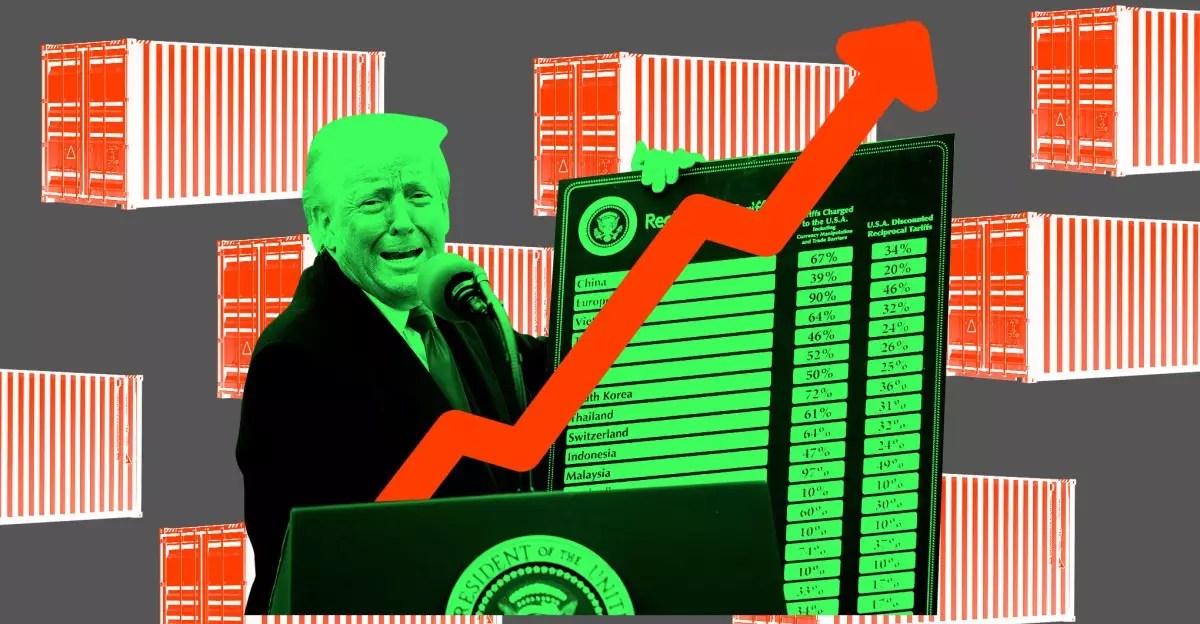In an age dominated by technological innovation, a surprising reversal of fortunes has emerged for major players in the tech sector. Companies like Meta, Apple, Tesla, and TikTok now find themselves entangled in the fallout from increasingly hostile global trade dynamics spearheaded by the U.S. government. Once heralded by tech leaders as potential allies, the Trump administration’s evolving stance has left these entities grappling with unexpected repercussions. The recent dialogues led by European Commission President Ursula von der Leyen, for instance, propose imposing a levy on digital services’ advertising revenues—a measure that, if enacted, could cripple the financial modeling of tech giants that have long relied on advertising as a primary source of income.
The landscape laid out by this Franco-American discord is one where these corporations now serve as mere pawns in a larger economic game. The anticipation that leaders like Mark Zuckerberg would shepherd policies favorable to Big Tech has all but evaporated, leaving many pondering whether the assumption of a friendlier administration was merely a miscalculation. As tariffs loom, the benefits that tech industry magnates hoped to reap now feel hollow.
The Unraveling of Corporate Support
For Tesla CEO Elon Musk, the fallout has been particularly marked. Once perceived as a pioneering force in the automotive and tech landscapes, Musk’s popularity in the U.S. has surprisingly inverted in tandem with his vocal support for President Trump. This pivot has not only affected Musk’s public perception but has also seen Tesla’s stock price plummet by over a third within the year, compelling the company to restrict sales of U.S.-manufactured vehicles in China. The shifting sands have culminated in a real-time reflection of how interlinked corporate strategies are with political climates, illuminating the stark reality that corporate fortunes can fluctuate drastically based on governmental policy decisions.
For TikTok, the stakes are equally high. As speculation mounts regarding its fate in the U.S. market amid escalating trade tensions, the app finds itself sandwiched between national interests and the demands of a competitive landscape. With the Chinese government expressing defiance against perceived undermining of its economic sovereignty, TikTok’s future hangs in the balance, revealing the potential vulnerabilities of companies reliant on cross-border interactions.
OpenAI: A Non-Profit or Profit-Driven Entity?
Within the tech ecosystem, OpenAI stands as a particularly intriguing example, as it navigates the dichotomy of its origins as a non-profit versus its burgeoning ambitions. The organization’s recent legal conflicts with Elon Musk further illustrate a fracture in the relationship between its foundational altruism and the profit-oriented maneuvers that have increasingly come into vogue. Critics, including former employees, are contributing to an expanding chorus of voices questioning whether OpenAI has compromised its mission. This scrutiny reflects a broader trend in which tech firms are grappling with the fine line between innovation and capitalistic pursuits.
Despite its challenges, OpenAI remains optimistic about its growth trajectory, buoyed by the escalating demand for AI solutions. Still, the clashing narratives surrounding its status as a charity versus a profit-seeking entity pose a substantial threat to its credibility and long-term sustainability within an industry characterized by rapid change and competitive intensity.
The Ripple Effects of Layoffs Amid Economic Uncertainty
The tech industry is simultaneously witnessing a wave of layoffs that further complicates the picture. Reports indicate that Google has initiated cuts within its Platform and Devices division, bewildering many employees with the terms of the reductions. A perplexing juxtaposition arises when they consider that those opting for voluntary layoffs earlier in the year received different severance terms. Such contrasts not only breathe confusion into an already turbulent corporate environment but also highlight the growing disconnect between higher management decisions and employee welfare.
This counterintuitive approach is indicative of the broader volatility permeating the tech sector. As firms grapple with shifting market demands, the recalibration of workforce structures has become indispensable, yet it consistently raises questions about the treatment of human capital in times of economic stress.
Shaking the Foundations: A Call to Action for Tech Leaders
The communication breakdown between tech giants and their respective governments serves as a cautionary tale that echoes through the corridors of power. Executives and thought leaders are compelled to recognize their roles as stakeholders in broader socio-political dialogues, as their platforms wield influence on both national and international scales. The nexus of technology and governance demands a renewed commitment to transparent communication and strategic foresight in navigating the complex interplay between innovation and regulation.
As this upheaval unfolds, it presents an opportunity for tech leaders to reevaluate their strategies and bolster their positions within a climate riddled with uncertainty. To survive and thrive, they must align their corporate missions with a commitment to foster goodwill with both consumers and governments, ensuring that they not only weather the storm but emerge as harbingers of positive change in a rapidly evolving landscape.


Leave a Reply